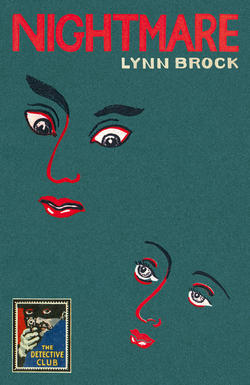Читать книгу Nightmare - Lynn Brock - Страница 10
2
ОглавлениеAt all events Agatha Judd—the brazen young trollop of the top flat—was quite sure that the gramophone’s persistency was amusing—the most priceless lark, in fact, that had so far diverted her light-hearted existence.
As Mr Knayle’s car disappeared from her view round the curve of Downview Road, once more the gramophone blared triumphantly the long-drawn closing note of ‘I can’t give you anything but love, Baby’. The needle slid off the record and the abrupt succeeding silence aroused her from her never-wearying contemplation of the passing traffic. But the disturbance caused her no resentment, though for two hours past, without intermission, at intervals of a few minutes, precisely similar disturbances had called her away from her window. Jamming a cigarette between her full, bedaubed lips, she flitted with hurrying eagerness out of the kitchen and along the little central corridor of the flat to where the gramophone stood on a small landing or platform at one side of the three steps descending from the corridor to the hall-door. Having started the needle once again upon its pilgrimage over the worn record, she wound up the instrument recklessly and then stood for some moments listening, her bold hazel eyes narrowed to exclude the smoke of her cigarette.
She was a slim, shapely girl of twenty-four or five and, despite her hardy allure, her powdered skin, and her salved lips, a noticeably good-looking young creature, obsessed by her own personal appearance, inefficient and lazy, equipped with the mentality of a Dunpool slum-child of ten, and possessed by a never-flagging determination to extract a bit of fun from life. At that moment, as has been said, despite the unavoidable monotony of the means, she was extracting a quite satisfying bit of it. As she stood listening, blissfully unaware of the grim fate whose scissors were already opening above her sleek little head, she smiled with vivid pleasure.
Stooping to the gramophone again—it rested on the bare boards of the little landing, whose carpet had been rolled back—she laid a finger against the edge of the record, increasing and relaxing its pressure alternately. The melody dissolved into hideous ululations, wailing and howling in dolorous insanity. She laughed softly while she continued this manipulation for a minute or so and then climbed over the balusters—relics of the former interior staircase of the house, removed at the time of the conversion—which enclosed the landing on two sides. Bracing herself, she sprang into the air and descended upon the boards with her full weight. The hollow, echoing reverberations which resulted—for the flooring beneath her high-heeled shoes consisted merely of match-boarding—widened her smile. She reproduced it with deliberation half a dozen times, then wound up the gramophone again, restarted the needle, climbed back over the balusters and, crossing the passage, entered the flat’s sitting-room.
In there Marjory Prossip, a heavily-built, sullen-faced young woman of thirty, sat bent over the construction of a silk underskirt. She turned her large, elaborately-waved head as Agatha entered and rose silently from her chair. For a moment of preparation the two faced one another in the middle of the room, then, together, they sprang ceilingward and descended upon the carpet with a violence which set the windows a-rattle. This athletic feat having been repeated several times, Miss Prossip reseated herself with her work and Agatha returned humming to the kitchen, pausing along the way to start the gramophone once more. No word had passed between them. Agatha had not troubled to remove her cigarette from her lips.
For five minutes, measured by a clock upon which she kept a watchful eye, Miss Prossip plied her needle industriously. She rose then and, joined by Agatha, hopped on one foot along the corridor, into a bedroom at the end of it, around the bedroom three times, and then back along the corridor to the sitting-room, where, rather blown, she resumed her sewing. No slightest change of expression manifested itself in her sulky, sallow face while she performed these curious gymnastics, which she executed with the solemnity of a ritual. In the agile Agatha, however, the awkward heaviness of her broad-beamed superior evoked a special gaiety. As she hopped behind Miss Prossip’s labouring clumsiness, she giggled happily.
Another five minutes passed and again Agatha entered the sitting-room, having again attended to the gramophone. Miss Prossip arose and faced her silently. Then, together, they sprang ceilingwards.
Some time later Mr Knayle had the curiosity to make some enquiries about Miss Prossip. He learned that she had always been regarded by people who knew her as of perfectly normal intelligence and general behaviour, had been educated at the local High School, (a celebrated one) where she had been considered by her mistress a rather clever girl, if somewhat difficult and moody, was passionately fond of music and played the violin with talent, and, in general, had been considered a perfectly normal and sensible person. Mr Knayle himself had frequently encountered her in the front garden and exchanged ‘good mornings’ and ‘good afternoons’ with her. His personal estimate of her, until the outbreak of the present hostilities, had been that she was a perfectly sane, if exceedingly unattractive, young woman. Slightly more intent observation of her, in the course of the past few weeks, had afforded him no reason to revise this opinion. Nothing that he ever subsequently learned about her or her family history ever afforded him the slightest reason to revise it. And so the fact is to be accepted that Marjory Prossip was an intelligent, well-educated, well-behaved, industrious, quiet girl of thirty, an accomplished violinist, and very fond of the kind of music which abhors tunes and never says the same thing twice.
